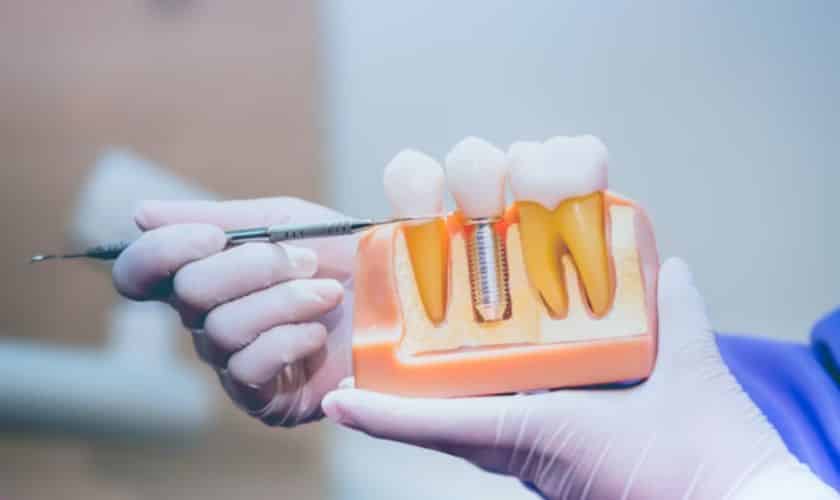Published on June 1, 2023

A confident smile is one of a person’s most valuable assets. However, missing teeth can diminish that confidence and affect oral health. Dental implants offer an excellent solution by restoring a natural smile’s functionality and aesthetics. This article will delve into dental implants, exploring their types, benefits, candidacy criteria, aftercare tips, and how they can transform your life.
Understanding Dental Implants:
Dental implants are artificial tooth roots made of biocompatible materials, typically titanium, that are surgically placed into the jawbone to support replacement teeth or dental bridges. They are a strong and stable foundation for prosthetic teeth, allowing for natural-looking and functional results. In addition, dental implants fuse with the jawbone through osseointegration, ensuring a secure and long-lasting tooth replacement option that closely mimics natural teeth’ look, feel, and function.

Source: Freepik
Types of Dental Implants:
1. Endosteal Implants:
- The most common type of dental implant.
- Placed directly into the jawbone.
- Typically made of titanium.
- Provides a strong and durable foundation for prosthetic teeth.
2. Subperiosteal Implants:
- Alternative option for patients with insufficient bone height.
- Placed on or above the jawbone, beneath the gum line.
- Utilizes a metal framework to support the prosthetic teeth.
- Suitable for patients who cannot undergo traditional implant surgery.
3. Zygomatic Implants:
- Specialized type of implant used in cases of severe bone loss in the upper jaw.
- Anchored in the cheekbone (zygomatic bone) instead of the jawbone.
- Provides stability and support for dental restorations.
4. All-on-4 Implants:
- Innovative implant technique that utilizes four strategically placed implants to support a full arch of teeth.
- Designed for patients with significant tooth loss or those seeking a complete smile makeover.
- Offers improved stability and reduced treatment time compared to traditional implant-supported dentures.
5. Mini Implants:
- Smaller in size compared to standard implants.
- Used in cases where there is limited bone density or space.
- Suitable for securing removable dentures or providing stability for single-tooth replacements.
6. Immediate Load Implants:
- Also known as “same-day implants” or “teeth in a day.”
- Involves placing dental implants and attaching temporary restorations in a single appointment.
- Provides immediate functionality and aesthetic improvements.
It is essential to consult with a dental professional to determine the most suitable type of dental implant based on individual needs, oral health conditions, and treatment goals.
Benefits of Dental Implants:
1. Enhanced Appearance: Uncover how dental implants closely mimic natural teeth, providing a seamless and aesthetically pleasing smile restoration.
2. Improved Functionality: Understand how dental implants offer stability and durability, allowing for better chewing, speaking, and oral function.
3. Bone Health Preservation: Discover how dental implants stimulate the jawbone, preventing bone loss and preserving facial structure.
4. Longevity and Cost-effectiveness: Explore the long-lasting nature of dental implants, which, with proper care, can endure for decades, making them a cost-effective solution in the long run.
5. Confidence and Self-esteem: Learn about dental implants’ positive impact on self-confidence and overall well-being.
Who Should Consider Dental Implants:
1. Individuals with Missing Teeth: Dental implants are an excellent option for people with one or more missing teeth for various reasons such as decay, injury, or congenital conditions.
2. Those Seeking a Permanent Solution: Dental implants offer a long-term and permanent solution for tooth replacement compared to temporary options like dentures or bridges.
3. Those Looking for Improved Functionality: Dental implants provide excellent chewing and speaking abilities similar to natural teeth, allowing individuals to enjoy their favorite foods without restrictions and confidently speak.
4. Individuals with Aesthetic Concerns: Dental implants closely resemble natural teeth, enhancing the appearance of the smile and restoring confidence in individuals who feel self-conscious about their missing teeth.
5. Patients Wanting to Preserve Facial Structure: Dental implants help maintain the structure of the face by stimulating the jawbone and preventing bone loss, which can occur when teeth are missing.
6. Those Wanting to Improve Oral Health: Dental implants do not require altering adjacent healthy teeth, as is necessary for dental bridges. They help promote better oral hygiene and make cleaning the teeth and gums easier.
Aftercare Tips for Dental Implants:
1. Oral Hygiene Practices: Discover the recommended oral hygiene routine, including regular brushing, flossing, and antimicrobial mouthwash, to keep dental implants and surrounding gums clean.
2. Regular Dental Check-ups: Understand the importance of scheduled dental visits for professional cleanings, examinations, and monitoring the health of your dental implants.
3. Lifestyle Considerations: Learn about habits to avoid, such as chewing on hard objects or biting into exceptionally tough foods, to protect your dental implants.
4. Nutritional Considerations: Explore the role of a well-balanced diet in maintaining oral health and supporting the longevity of dental implants.
Source: Kantor Dental Group
Dental implants have transformed the landscape of modern dentistry, offering a reliable, long-lasting, and natural-looking solution for missing teeth. Through their various benefits, including enhanced aesthetics, improved functionality, and preserved oral health, dental implants have become a go-to option for individuals seeking complete smile restoration. If you are considering dental implants, consult a qualified dental professional to determine your candidacy and embark on the journey to reclaiming your smile and confidence. With dental implants, you can experience the joy of a restored smile and its positive impact on your overall quality of life.
